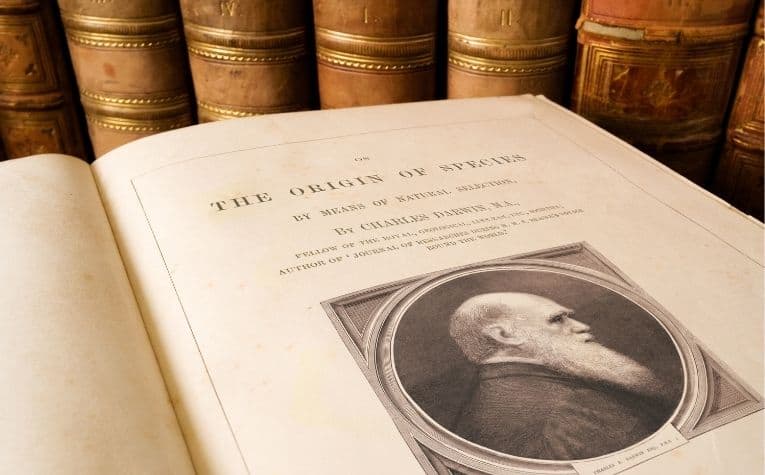The origin of human beings is an important topic in Baptist denominations and churches, just as it is in other branches of the Christian faith. Did God create human beings immediately and purposefully, or are people the product of Darwinian evolutionary processes?
Baptist denominations and churches have traditionally affirmed God’s immediate and purposeful creation of human beings in their confessions and belief statements, as described in Genesis 1-2. Yet some individual Baptist theologians, pastors, and church members subscribe to Charles Darwin’s theory of evolution.
Does this mean that Baptists interpret Genesis 1-2 literally? Is there a hybrid view? Can individuals who believe in Darwinian evolution be members in good standing in Baptist churches? Keep reading to learn more.
Also, see What’s the Difference Between Baptists and Evangelicals? to learn more.

Darwinian Evolution vs. Baptist Theology
Darwinian evolution and Baptist theology represent two common and influential worldviews, especially in America. Each one offers explanations for how life on Earth originated.
Moreover, for people who subscribe to them, Darwinism and Baptist perspectives often dictate how a person understands meaning, purpose, and faith.
Since the 19th century, Darwinism has been the majority view on the origins of life in the established scientific community. Yet Baptist churches comprise the largest branch of Christianity in America. These facts make the interaction between these worldviews inevitable and sometimes controversial. (Also see Here’s What Baptists Believe About Salvation)
Early Baptists vs. modern Baptists? As seen below, historical Baptist confessions affirm a literal understanding of the creation account described in Genesis 1-2. The description is literal history to early Baptists: God created the universe in seven consecutive 24-hour days. (Also see Do Baptists Believe in Angels?)
Many present-day Baptists agree with the historical confessions, not necessarily out of an allegiance to the belief statements per se, but because of their conviction that the best way to interpret the creation account is literally.
The three views among Baptists today may be summarized this way:
- Full affirmation of creationism: Many Baptists affirm the literal interpretation of Genesis 1-2. The doctrine is often called “creationism” and its adherents “creationists.” Many believe Genesis’ description can be defended scientifically. They also see significant, insurmountable problems with Darwinian evolution.
- A hybrid model: Other present-day Baptists hold to a hybrid perspective, which incorporates aspects of both worldviews. Adherents adopt elements of Darwinian evolution and attempt to meld them with Baptist convictions to maintain the main principles of each worldview.
- Full affirmation of Darwinian evolution: A small number of Baptists argue that Darwinian evolution is true in its entirety. Some argue that God guided the evolutionary process, while others accept the randomness reflected in the Darwinian hypothesis.

Baptists Opposed To Evolution
Historically, the Baptist tradition has strongly believed that the seven-day creation account in Genesis 1-2 is true. This view is reflected in many of their confessions. Note: a “confession” that a denomination or church articulates is a document comprised of doctrinal statements.
Three representative statements on creation from Baptist confessions reflect this:
| Helwys Declaration (1611) |
| “That this GOD in the beginning created all things of nothing, (Genesis 1:1) and made man of the dust of the earth. (Genesis 2:7).” [1] |
| The Philadelphia Confession (1742) |
| “In the beginning it pleased God the Father, Son, and Holy Spirit, for the manifestation of the glory of His eternal power, wisdom, and goodness, to create or make the world, and all things therein, whether visible, or invisible, in the space of six days, and all very good.” [2] |
| Bible Baptist Union of America (1923) |
| “We believe in the Genesis account of creation, and (a) that it is to be accepted literally, and not allegorically or figuratively; (b) that man was created directly in God’s own image and after his own likeness; (c) that man’s creation was not a matter of evolution or evolutionary change of species, or development through intenable periods of time from lower to higher forms; (d) that all animal and vegetable life was made directly, and God’s established law was they should bring forth only “after their kind.” [3] |
The Baptists that oppose Darwinian evolution in its entirety believe that the theory isn’t compatible with Scripture and that it is incompatible with doctrines like the imago dei, i.e., that people are made in God’s image. In relation to the application, the creation account is an important reason why all life is sacred, including the unborn. (Also see What Bible Translation Do Baptists Use?)
Many Baptist creationists make a distinction between “macro-evolution” and “micro-evolution.” Macro-evolution involves one species evolving into another species. Micro-evolution involves changes that occur within a species due to varying factors in its environment. Darwinian evolutionists don’t use these terms because they believe they are inaccurate.
Baptists who believe evolution is compatible with Scripture
While some Baptists who adopt a hybrid view of Darwinism and Baptist theology have a low view of Scripture — meaning they don’t believe it is the inspired Word of God — others have a different interpretative approach to Genesis 1-2.
For example, some believe that the creation account isn’t meant to be understood literally. They argue that there are details in the passage that reflect Hebrew poetry as opposed to narrative history.
This conviction leads some who have this view to adopt the modern scientific consensus without jeopardizing the Bible’s truth claims. (Also see Do Baptists Believe in Cremation?)
Critics of this view suggest that modern scientific consensus leads people with this view to interpret Genesis 1-2 figuratively rather than the other way around.

Baptists Who Affirm Darwinian Evolution
Some Baptists subscribe to Darwinian evolution in its entirety without reservation. Science can reveal God’s truth just as Scripture can, and science leaves no room for doubt, according to this view.
What about the historic confessions? Some Baptists who hold this view argue that many of the historic confessions were written before the time of Darwin and, therefore, their authors were ignorant of the scientific breakthroughs of the 19th century. This fact renders many of the early confessions outdated and lacking in contemporary relevance.
What about Scripture? Many Baptists who hold this view don’t have a high view of Scripture, according to those that disagree. Baptist Darwinists either don’t believe Scripture is inspired, or they have a different definition of inspired than orthodox Baptist theology does. (Also see Do Baptists Believe In the Holy Spirit?)
Can a Darwinist Be a Member of a Baptist Church?
The Baptist tradition values the autonomy of its local fellowships, which means that often individual churches can decide what their boundaries are concerning people who hold to the teachings of Darwinism.
The belief statement for one Baptist church may include a statement about the doctrine of creation, while another church’s statement doesn’t. (Also, see Do Baptists Believe In Original Sin?)
What about membership? The first question is (1) “Does membership require complete agreement with the church’s belief statements?” The follow-up question is (2) “What does the belief statement say about creation, if anything?”
If the belief statement is silent about the doctrine, then the pastor or elderboard will decide whether to accept the person into membership. (Also see Can a Methodist Take Communion in a Catholic Church?)
Common options include:
- The person can attend the church and serve in certain roles, but they can’t be members or have the privileges of one
- The person can be a member and serve in certain roles, but they can’t hold any leadership office or participate in certain ministries, like teaching and preaching
- The person can’t be a member or serve in any capacity
References:
[1] Source
[2] Source
[3] Source
Related Questions
The Baptist tradition, like other branches of the Christian faith, has a variety of expressions. The different names of denominations and churches within the tradition reflect this. Understanding...
Baptist denominations and churches, which date to the 17th century, comprise one of the largest branches of Christianity in the Western world. While Christian churches in Baptist networks and...
